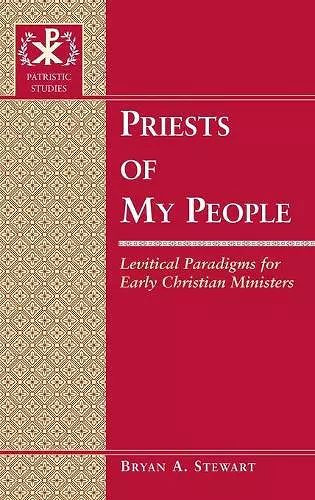Priests of My People
Levitical Paradigms for Early Christian Ministers
Bryan A Stewart author Gerald Bray editor
Format:Hardback
Publisher:Peter Lang Publishing Inc
Published:31st Mar '15
Currently unavailable, and unfortunately no date known when it will be back

This book offers an innovative examination of the question: why did early Christians begin calling their ministerial leaders «priests» (using the terms hiereus/sacerdos)? Scholarly consensus has typically suggested that a Christian «priesthood» emerged either from an imitation of pagan priesthood or in connection with seeing the Eucharist as a sacrifice over which a «priest» must preside. This work challenges these claims by exploring texts of the third and fourth century where Christian bishops and ministers are first designated «priests»: Tertullian and Cyprian of Carthage, Origen of Alexandria, Eusebius of Caesarea, and the church orders Apostolic Tradition and Didascalia Apostolorum. Such an examination demonstrates that the rise of a Christian ministerial priesthood grew more broadly out of a developing «religio-political ecclesiology». As early Christians began to understand themselves culturally as a unique polis in their own right in the Greco-Roman world, they also saw themselves theologically and historically connected with ancient biblical Israel. This religio-political ecclesiology, sharpened by an emerging Christian material culture and a growing sense of Christian «sacred space», influenced the way Christians interpreted the Jewish Scriptures typologically. In seeing the nation of Israel as a divine nation corresponding to themselves, Christians began appropriating the Levitical priesthood as a figure or «type» of the Christian ministerial office. Such a study helpfully broadens our understanding of the emergence of a Christian priesthood beyond pagan imitation or narrow focus on the sacrificial nature of the Eucharist, and instead offers a more comprehensive explanation in connection with early Christian ecclesiology.
«Priests of My People is a fresh contribution to our understanding of the historical development of the ‘priesthood.’ Bryan A. Stewart shows that the Christian bishop was not, as is commonly held, called priest because he presided at the sacrifice of the Eucharist. Rather it was as head of the community, the new Israel, the Christian polis that the term priest came into general usage. This provocative book breaks through the shibboleths that have marked Protestant and Catholic debates to offer an ecumenical understanding of the Christian ministry.» (Robert Louis Wilken, William R. Kenan, Jr., Professor of the History of Christianity Emeritus, The University of Virginia)
«This book is valuable simply for challenging the widespread assumptions that the Christian ‘priesthood’ came to be around 200 due to pagan models or to a new understanding of the Eucharist as a sacrifice. Far more than this, however, Bryan A. Stewart demonstrates that the late-second- and early-third-century designation of Christian ministers as ‘priests’ richly exemplifies development of doctrine – not merely the development of ideas, but rather ideas thoroughly contextualized within Christian material culture, sacred space, and religio-political worldview. As Stewart makes clear, the newly developed typological connections with the Levitical priesthood accord with the trajectory of the New Testament and the Apostolic Fathers, in a manner that prior scholars overlooked. This erudite and rewarding book is a major step forward for those interested in how doctrine developed in the early Church.» (Matthew Levering, Perry Family Foundation, Professor of Theology, Mundelein Seminary)
«Bryan A. Stewart deploys a supple ‘religio-political ecclesiology’ and notions of sacred space to explain the emergence of a new, Christian form of priestly leadership in the early church. Understanding the church as itself a polis provided the context in which early Christians drew parallels between the Levitical, Aaronic priests of Israel and the new ministers who presided over Christian communities. Stewart’s historical case is compelling, and along the way he makes an important contribution to long-standing ecumenical debates concerning the nature and sources of the Christian ministry.»
(Peter Leithart, President, Theopolis Institute, Birmingham, Alabama)
ISBN: 9781433127618
Dimensions: unknown
Weight: 480g
250 pages
New edition